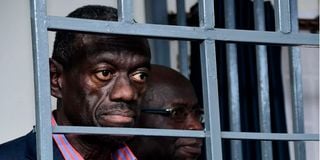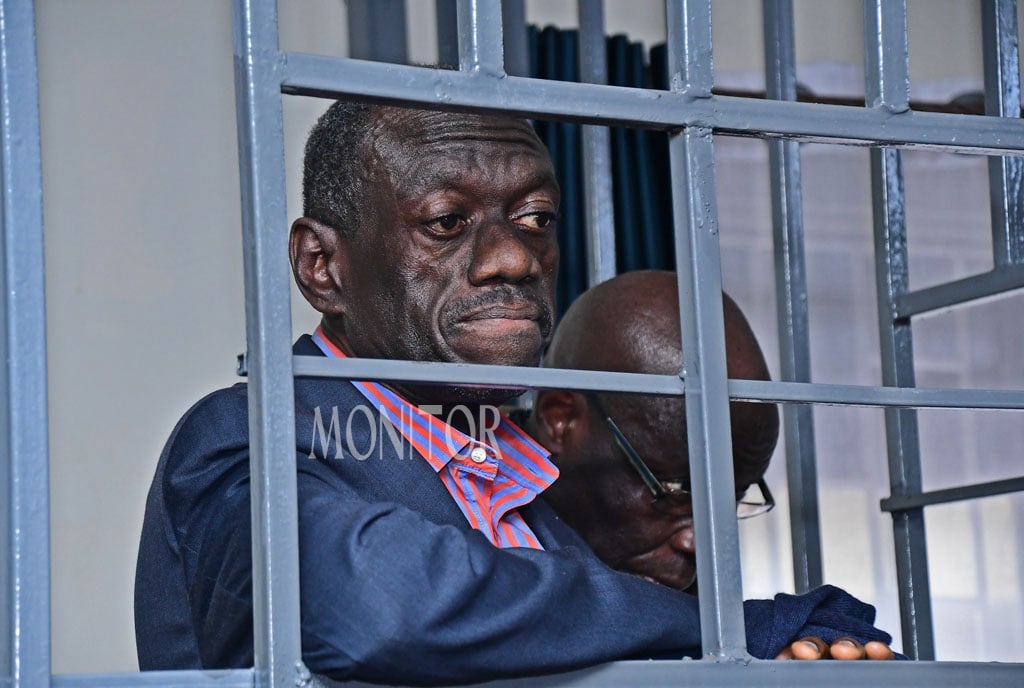
Ugandan opposition politician Kizza Besigye.
The administration of Justice in Uganda’s General Court Martial has been cast once again into the limelight. The focus on this seven-member military tribunal led by Brigadier Robert Freeman Mugabe comes after veteran opposition leader Kizza Besigye and his associate Hajj Obeid Lutale were charged after being abducted by security operatives in Nairobi.
The perception that this military court is remotely controlled by President Yoweri Museveni since he is the Commander–in–Chief played out when Dr Besigye told the panel that had read him the charges that they have no jurisdiction over him since he is civilian. Dr Besigye’s claim was predictably rejected by Brig Mugabe’s team, insisting they have the jurisdiction to try civilians under the Uganda People’s Defence (UPDF) Act.
Dr Besigye is a veteran of the bush war that catapulted Museveni to power in 1986, but under acrimonious circumstances, he retired from UPDF in 2001, having attained the rank of colonel. This is the second time he is being court-martialled by the administration he once served. During the civil war in the 1980s, he was Museveni’s personal doctor.
Dr Besigye’s position when he appeared before the court is buttressed by Justice Kenneth Kakuru’s judgement, rejecting the trial of civilians in the Court Martial in a constitutional court petition filed by former opposition panel member, Michael Kabaziguruka, who had been charged with treason. “The General Court Martial, therefore, is a specialised court, set up by parliament clearly and is not part of the judiciary.
It is part of the executive arm of government established under Chapter 12 of the Constitution which provides for the country’s defence and national security,” Justice Kakuru, who has since passed on, added: “Several attempts by the Executive to place the General Court Martial under the same footing as Courts of Judicature has, in my view, created confusion and discord among jurists, legal practitioners and scholars. It is simply trying to fit a square peg around a hole.”
Justice Remmy Kasule, another member of the panel that heard Kabaziguruka’s petition, concluded that civilians cannot get a fair trial in the military court. “By the Court Martial extending its jurisdiction to try civilians who are not members of the UPDF in respect of all offences under the penal code Act and other enactments subjects ordinary civilians to criminal prosecutions that have no safeguards of a fair trial and proper administration of justice, the ensuring of which is a constitutional duty of the DPP,” he said, adding that this is inconsistent with the intent, purpose and overall spirit of the Constitution.
A 2011 report by Human Rights Watch noted that since 2002, military courts in Uganda had prosecuted more than 1,000 civilians for offences under the criminal code that included murder and armed robbery. The civil society organisation pointed out at the time that “not only have hundreds of civilians been convicted by courts that did not meet international standards of competence, independence, and impartiality, but that military courts have routinely violated fundamental fair trial rights, such as the right to present a defence, the right against self-incrimination, and the prohibition on the use of evidence procured by torture”.
This week, the rights group said: “For years, military courts in Uganda have been misused to prosecute civilians, particularly opposition supporters, despite a 2021 Constitutional Court ruling against the practice.” The military justice system in Uganda can be traced back to the 1900s during the British colonial rule. Throughout colonial times and immediately after independence, the courts were preserved for serving military personnel. But this changed in 1973 when dictator Idi Amin expanded the jurisdiction of military tribunals to include the trial of civilians accused of committing capital offences.
Read: Uganda court charges Besigye with 'illegal possession of pistols' in Kenya, Greece and Switzerland
Ronald Naluwairo, a lecturer at Makerere University’s School of Law, says the most abominable courts-martial in Uganda‘s post-independence history, especially as far as upholding the right to a fair trial is concerned, were those established during Amin‘s regime. Contending that Amin’s tribunals were staffed with illiterate individuals who did not have any basic understanding of the law, Museveni‘s military tribunals under the National Resistance Army (NRA) Codes of Conduct were not any better.
When Museveni took over power in 1986 after overthrowing President Tito Okello, his administration was keen to prove it was not a mere change of guard but a fundamental change. However, despite indications of reforming the military justice system, he notably established the General Court Martial as the supreme trial organ.
“First, the members of these tribunals did not enjoy any meaningful security of tenure and were not insulated from the command influence to guarantee their independence,” says Naluwairo. “The independence of the general court-martial and indeed other courts-martial established by the NRA codes was compromised by the fact that the High Command (which is part of the executive) appointed both the members of the court and the prosecutors. Further, the appointment of judge advocates was not done by an independent authority; it was done by the High Command which also appointed the members of court and the prosecutors.”
Dr Besigye was the first high-ranking former NRA officer to face a General Court Martial when in 2005 he was charged with terrorism and possession of firearms. The state, however, made a legal mistake because the offences arose from the same facts as the treason and misprision of treason charges previously preferred against the accused in the High Court. Dr Besigye’s legal team exploited this mistake by ensuring that the case stayed in the civilian courts.
Justice Kasule, who has since retired having been elevated to the Court of Appeal, was the first to issue an injunction, staying Dr Besigye’s trial in the Court Martial. With the army refusing to release Dr Besigye, who had been granted bail by the High Court, his legal team’s next move was to apply for a habeas corpus (an application challenging an unlawful detention or imprisonment) in the High Court. This prompted Justice John Bosco Katutsi, who has since retired, to rule that the “continued detention of Besigye on a purported warrant of commitment from the (Court Martial) was illegal, unlawful and in contempt of the High Court order to release him on bail.” He ordered Besigye’s immediate release.
Without challenging the rulings of the High Court, Gen Elly Tumwine, then the Chairperson of the Court Martial, continued with the trial. Even when the Constitutional Court pronounced itself on the matter, declaring that the military court did not have the jurisdiction to try Besigye and his co-accused, Gen Tumwine was having none of it. Following the judgement by the Constitutional Court, the judiciary came under heavy attack from the military establishment with Gen David Sejusa, then Coordinator of Security Agencies, insisting that “courts of law cannot order the army… the army would not accept this business of being ordered by judges”. Gen Sejusa’s conclusion that the judges had decided to side with “wrongdoers instead of helping the State” was supported by President Museveni who vowed to fight the Constitutional Court ruling legally and politically.
In a rather strange turn of events, Gen Tumwine announced that he would not proceed with the trial of the accused until the Supreme Court had pronounced itself on the matter. Sejusa fell out with the regime in 2013 when he authored a dossier that was leaked to the media asking for an investigation into a plot to kill those who were against Museveni’s alleged plan of grooming his son Gen Muhoozi Kainerugaba for power.
Writing clandestinely to the head of the Internal Security Organisation, Gen Sejusa called for an investigation into what he termed as claims of a plot to “assassinate people who disagree with the so-called family project of holding onto power in perpetuity”. He fled to exile but made a return in 2015 just in time for the preparations of the General Election the following year. He attended meetings of opposition parties but was arrested and charged in the General Court Martial with charges ranging from participating in political party activities, insubordinate behaviour, and conduct prejudicial to good order and discipline of UPDF Act 2005.
When appeared before the military court on February 3, 2016, he protested the filth he had witnessed in the military cells he was being held in. “I am comfortable in the place where I have been put. The problem I have is that it’s the same dungeon that Idi Amin locked me in, in 1976,” he said. Sejusa, like Besigye, insisted that the court martial had no jurisdiction over him since had been “constructively” retired from the army.
The reason civilians avoid the military courts at all costs was clear when Sejusa, who has since retired from the army, asked for bail. Getting bail proved to be futile despite Sejusa presenting witnesses that included Kampala Lord Mayor Erias Lukwago and Deo Kizito, a medical surgeon. Major General Levi Karuhanga’s Court Martial rejected the witnesses saying civilians can’t stand surety for a military man at the rank of General.
General Karuhanga, who has since passed on, made the whole process of getting bail extremely hard when he asked Sejusa to get serving army generals to be his sureties. The consensus was that, on account of having fallen out with the establishment, it was difficult for Sejusa to convince serving army generals to be his sureties. To free himself from the Court Martial, Sejusa dashed to the High Court’s civil division.
Consequently, he challenged his trial in a military court because he had been retired. With that, Justice Margaret Oumo Oguli, who has since retired, suspended Sejusa’s trial before the Court Martial until Sejusa’s claim of being retired constructively was determined.
Sejusa used this opportunity to ask the High Court’s criminal division to grant him bail, which Justice Wilson Masalu Musene did, offering Sejusa freedom after months in which he had been incarcerated at Makindye military barracks cells and Luzira prisons. In 2013, another Bush war veteran General Henry Tumukunde, then a Brigadier, was a happy man after Court Martial then chaired by the witty Major General Fred Tolit freed him. That judgment had ended eight trying years that included a meandering trial and 18 months of imprisonment in the officers’ mess, Kololo, Kampala, over charges of spreading harmful propaganda and military misconduct.
An officer convicted of conduct prejudicial to good order and discipline of the army is liable to a sentence ranging between a caution to dismissal from the army with disgrace while if found guilty of spreading harmful propaganda, an officer can be sentenced to death or life in prison, according to the UPDF Act.
Whilst Tumukunde who has in the past headed both the Chieftaincy of Military Intelligence (CMI) and the Internal Security Organization (ISO) was found guilty of conduct prejudicial to good order and discipline in the army, Tolit only handed out a light sentence – a “severe reprimand”. Tumukunde’s troubles stemmed from his 2005 appearance on two radio stations - Central Broadcasting Services (CBS) and Radio One – based in Kampala. On both radio stations, he voiced his disenchantment with how President Museveni was managing the country. On CBS Tumukunde said: “I want to retire from the army but they are not releasing me.”
At the time the prickly issue of lifting the presidential term limits had put the country on tenterhooks but that didn’t stop Tumukunde then a serving military officer from commenting on it. “Changing the Constitution has a terrible history in Uganda. (Milton) Obote changed it and you saw the outcome, it started the chain of so many problems in the country. Uganda’s Supreme Court, following an appeal by the Attorney General, yet to determine the constitutionality of trying civilians in military courts.











